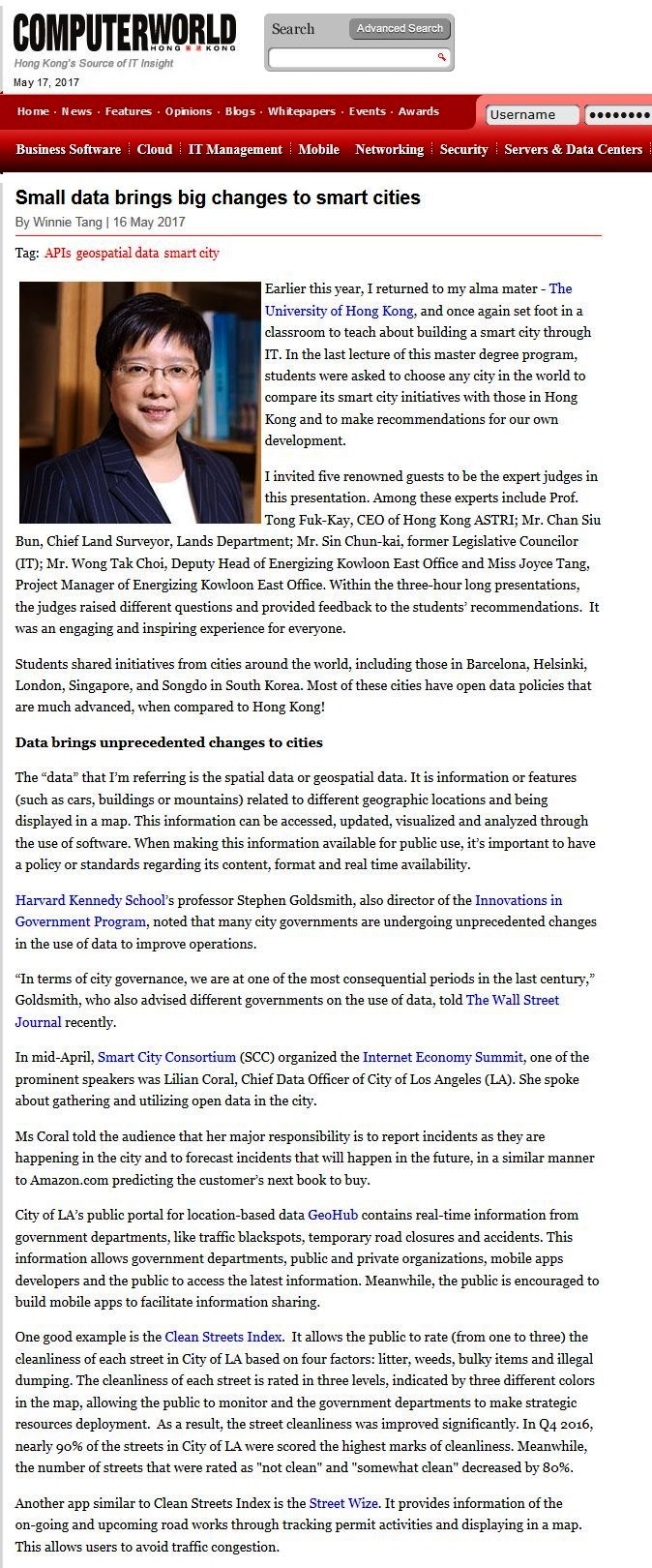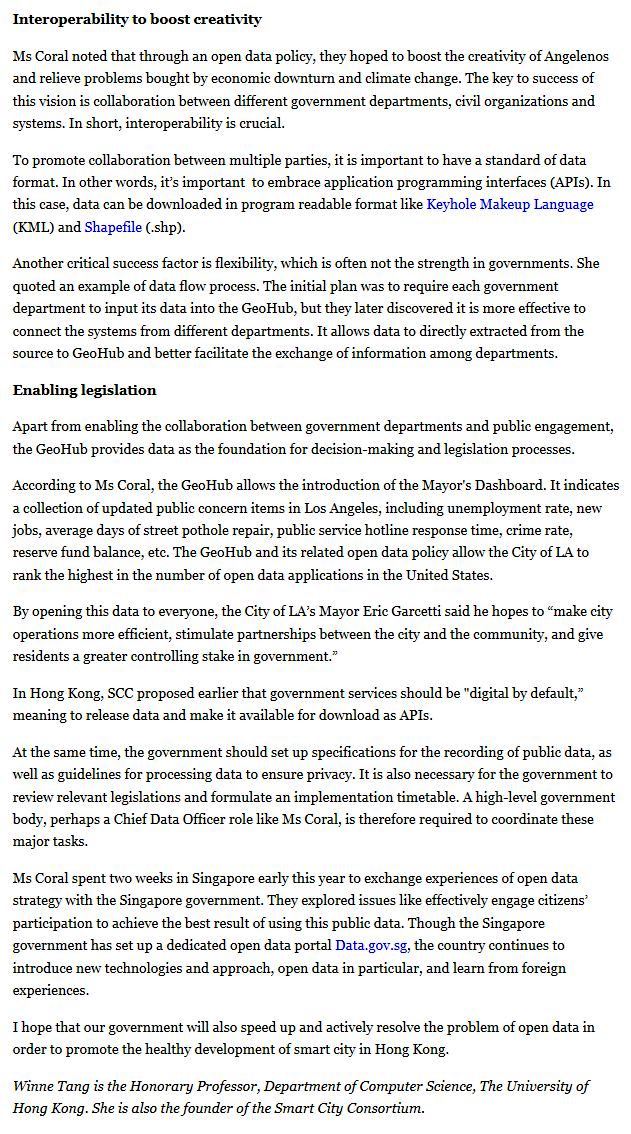網上版請按此


Small data brings big changes to smart cities
Earlier this year, I returned to my alma mater - The University of Hong Kong, and once again set foot in a classroom to teach about building a smart city through IT. In the last lecture of this master degree program, students were asked to choose any city in the world to compare its smart city initiatives with those in Hong Kong and to make recommendations for our own development.
I invited five renowned guests to be the expert judges in this presentation. Among these experts include Prof. Tong Fuk-Kay, CEO of Hong Kong ASTRI; Mr. Chan Siu Bun, Chief Land Surveyor, Lands Department; Mr. Sin Chun-kai, former Legislative Councilor (IT); Mr. Wong Tak Choi, Deputy Head of Energizing Kowloon East Office and Miss Joyce Tang, Project Manager of Energizing Kowloon East Office. Within the three-hour long presentations, the judges raised different questions and provided feedback to the students’ recommendations. It was an engaging and inspiring experience for everyone.
Students shared initiatives from cities around the world, including those in Barcelona, Helsinki, London, Singapore, and Songdo in South Korea. Most of these cities have open data policies that are much advanced, when compared to Hong Kong!
Data brings unprecedented changes to cities
The "data" that I'm referring is the spatial data or geospatial data. It is information or features (such as cars, buildings or mountains) related to different geographic locations and being displayed in a map. This information can be accessed, updated, visualized and analyzed through the use of software. When making this information available for public use, it's important to have a policy or standards regarding its content, format and real time availability.
Harvard Kennedy School's professor Stephen Goldsmith, also director of the Innovations in Government Program, noted that many city governments are undergoing unprecedented changes in the use of data to improve operations.
"In terms of city governance, we are at one of the most consequential periods in the last century," Goldsmith, who also advised different governments on the use of data, told The Wall Street Journal recently.
In mid-April, Smart City Consortium (SCC) organized the Internet Economy Summit, one of the prominent speakers was Lilian Coral, Chief Data Officer of City of Los Angeles (LA). She spoke about gathering and utilizing open data in the city.
Ms Coral told the audience that her major responsibility is to report incidents as they are happening in the city and to forecast incidents that will happen in the future, in a similar manner to Amazon.com predicting the customer's next book to buy.
City of LA's public portal for location-based data GeoHub contains real-time information from government departments, like traffic blackspots, temporary road closures and accidents. This information allows government departments, public and private organizations, mobile apps developers and the public to access the latest information. Meanwhile, the public is encouraged to build mobile apps to facilitate information sharing.
One good example is the Clean Streets Index. It allows the public to rate (from one to three) the cleanliness of each street in City of LA based on four factors: litter, weeds, bulky items and illegal dumping. The cleanliness of each street is rated in three levels, indicated by three different colors in the map, allowing the public to monitor and the government departments to make strategic resources deployment. As a result, the street cleanliness was improved significantly. In Q4 2016, nearly 90% of the streets in City of LA were scored the highest marks of cleanliness. Meanwhile, the number of streets that were rated as "not clean" and "somewhat clean" decreased by 80%.
Another app similar to Clean Streets Index is the Street Wize. It provides information of the on-going and upcoming road works through tracking permit activities and displaying in a map. This allows users to avoid traffic congestion.
Interoperability to boost creativity
Ms Coral noted that through an open data policy, they hoped to boost the creativity of Angelenos and relieve problems bought by economic downturn and climate change. The key to success of this vision is collaboration between different government departments, civil organizations and systems. In short, interoperability is crucial.
To promote collaboration between multiple parties, it is important to have a standard of data format. In other words, it's important to embrace application programming interfaces (APIs). In this case, data can be downloaded in program readable format like Keyhole Makeup Language (KML) and Shapefile (.shp).
Another critical success factor is flexibility, which is often not the strength in governments. She quoted an example of data flow process. The initial plan was to require each government department to input its data into the GeoHub, but they later discovered it is more effective to connect the systems from different departments. It allows data to directly extracted from the source to GeoHub and better facilitate the exchange of information among departments.
Enabling legislation
Apart from enabling the collaboration between government departments and public engagement, the GeoHub provides data as the foundation for decision-making and legislation processes.
According to Ms Coral, the GeoHub allows the introduction of the Mayor's Dashboard. It indicates a collection of updated public concern items in Los Angeles, including unemployment rate, new jobs, average days of street pothole repair, public service hotline response time, crime rate, reserve fund balance, etc. The GeoHub and its related open data policy allow the City of LA to rank the highest in the number of open data applications in the United States.
By opening this data to everyone, the City of LA's Mayor Eric Garcetti said he hopes to "make city operations more efficient, stimulate partnerships between the city and the community, and give residents a greater controlling stake in government."
In Hong Kong, SCC proposed earlier that government services should be "digital by default," meaning to release data and make it available for download as APIs.
At the same time, the government should set up specifications for the recording of public data, as well as guidelines for processing data to ensure privacy. It is also necessary for the government to review relevant legislations and formulate an implementation timetable. A high-level government body, perhaps a Chief Data Officer role like Ms Coral, is therefore required to coordinate these major tasks.
Ms Coral spent two weeks in Singapore early this year to exchange experiences of open data strategy with the Singapore government. They explored issues like effectively engage citizens' participation to achieve the best result of using this public data. Though the Singapore government has set up a dedicated open data portal Data.gov.sg, the country continues to introduce new technologies and approach, open data in particular, and learn from foreign experiences.
I hope that our government will also speed up and actively resolve the problem of open data in order to promote the healthy development of smart city in Hong Kong.
Dr. Winnie Tang
Honorary Professor, Department of Computer Science, The University of Hong Kong